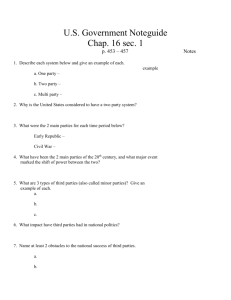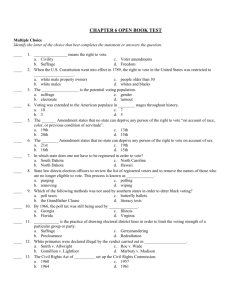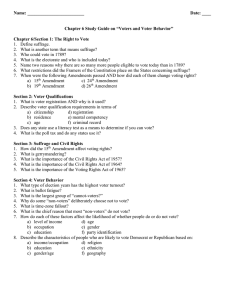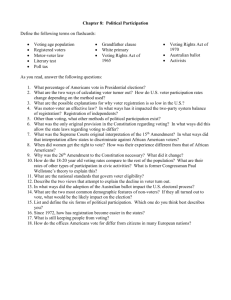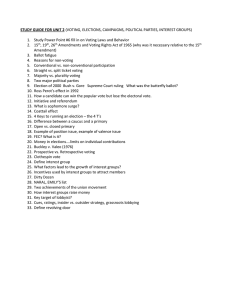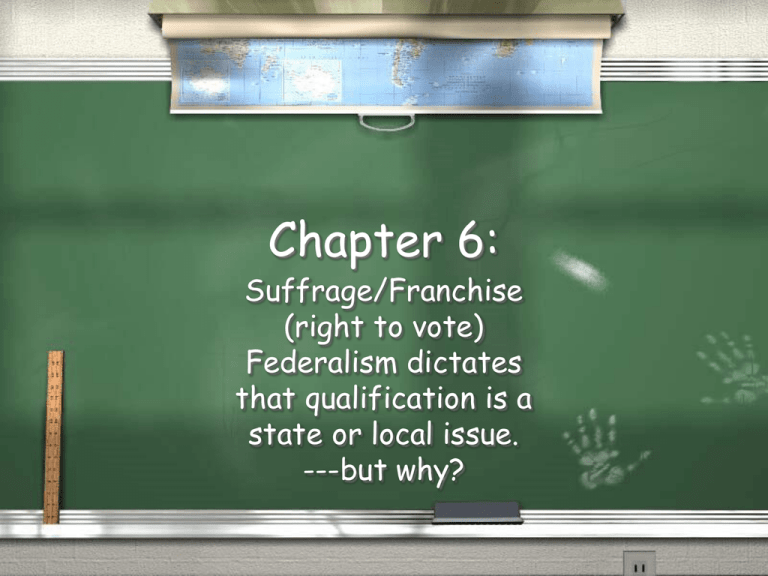
Chapter 6:
Suffrage/Franchise
(right to vote)
Federalism dictates
that qualification is a
state or local issue.
---but why?
1789
At
first only white
male property
owners
Benjamin
Man
Today’s
Voting
Franklin
or the jackass
electorate
population
210 million
Two Trends
1.
Elimination
Gradual
removal of
restrictions
Race,
2.
sex, religion,
property ownership
Federalism
Responsibility
is
gradually shifting
to the federal level.
Extending Suffrage
1.
Removal of
religious and
property
qualification
1810
2.
all white males
Removal of
Racial qualification
15th
amendment
3.
Removal of Sex
qualification
19th
amendment
4.
Removal of burdens
5.
Set minimum age at
18
Civil
Rights Acts
Poll tax and other
raciest laws
Restrictions on State’s Right to
set voting qualifications
1.
Vote in all elections
2. Restrictions on race
3. Restrictions on sex
4. payment
5. 18 years old
Where
are these
restrictions listed?
Why must the states
obey this?
Universal Requirements: 3
1.
Citizenship
Constitution
says
nothing on this matter
At
one time
territories allowed non
citizens to vote to
attract settlers
Distinctions between
native and foreign born
citizens
Minnesota:
3
Pennsylvania: 1
Residency as a Universal
Requirement
All
states require you to be
a legal resident of that
state in order to vote
Why?
Importing
Familiar with
candidate
local regent and
Growing
trend in reducing
time required
Exceptions
Transients…no
College students…yes
Final Universal Requirement
Pg
153
18
Why?
World
war two
Vietnam
How successful has
it been?
Never
48%
higher then
Registration
Procedure
of voter
identification intended
to prevent fraudulent
voting
1900
Europe
Why
here?
Motor
Voter Law
Make registration
easier
How important is the right to vote?
To those who lack it, life itself.
During
the 1960
Civil Rights
Workers
Arrest
Beatings
Cattle
Death
prods
lynching
15th Amendment
Cannot
be denied
to any citizen of
the United States
because of race,
color, or condition
of servitude
Not
self-executing
Lack enforcement
Congress must act
Congress: The Federal Governments
attempt to reverse federalism
Tactics
to evade
the 15th
Violence
Literacy
tests
Registration laws
Poll taxes
Gerrymandering
Political “private”
parties
Congress
Outlaw
Acts
exclusion from
political parties
1944
Smith
v Allwright
Gerrymandering
1960
Gomillion
Civil
v Lightfoot
Rights Laws
1960
Martin
Luther King Jr.
Civil Rights Acts solidify the
15th Amendment
1957
Civil
Rights Act
Civil
Right Commission
Inquire
Report to Congress and Public
Power to refer problems to federal
1960
court
Federal
voting referees
Serve
anywhere where federal court
finds a problem
Help with voter registration
Another Civil Rights Act
1964
Outlaws
discrimination
Federal
Crime
Injunction
Restrains
the
actions of another
individual
Federal crime
1965 Johnson answers Dr.
King’s Call…
1965
Applies to all elections
Must revote on extension
Pre-clearance
Location of polling places
Boundaries of election districts
Deadlines in the election
process
Ward to at large election
Qualifications candidates must
meet
Book Work
Section
4
Assessment
Page 172
1-6

